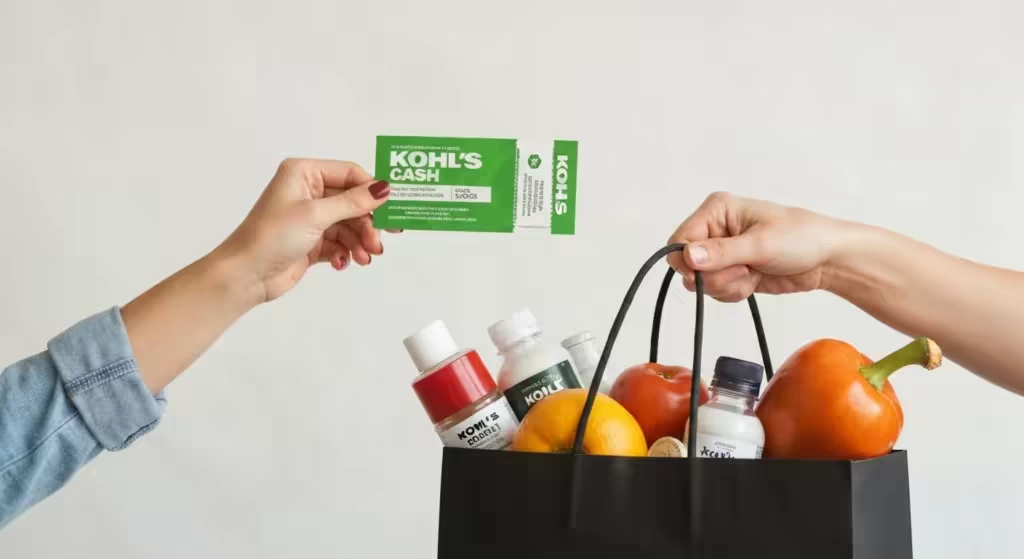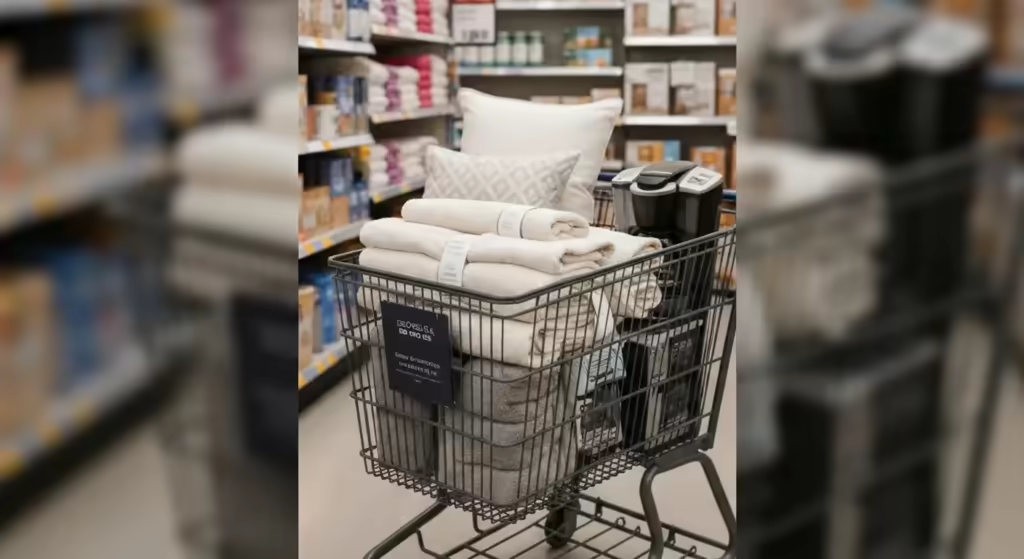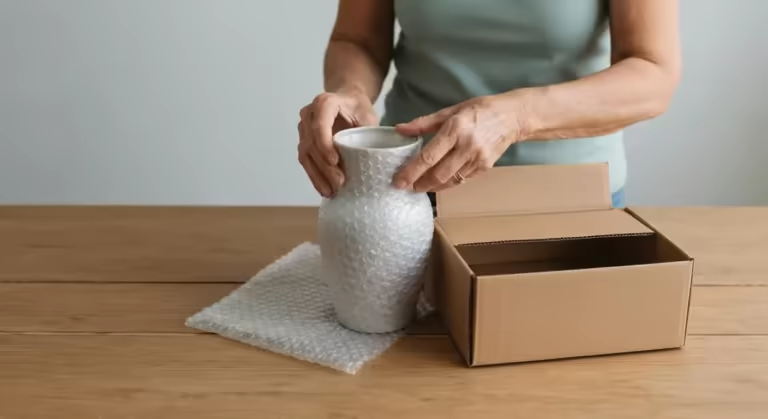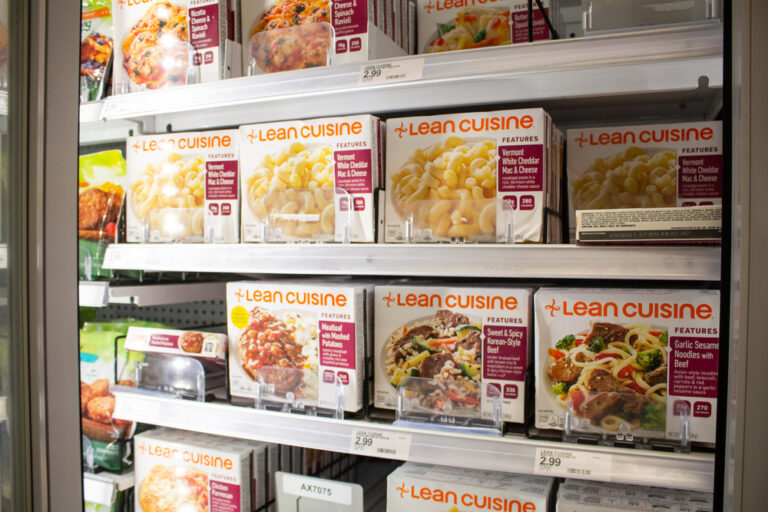What are some groceries you should never buy on sale?
Whether you’re walking by a display in a supermarket or a boutique in town, one thing is sure: If there’s a sale sign, chances are you’re going to take advantage. The psychology of a discount is powerful, making us feel like we’re being savvy and resourceful. And while there’s no better feeling than saving some money here and there, grocery store discounts aren’t always worth it. In fact, some “deals” can end up costing you more in the long run.
In recent months, a perfect storm of global events has impacted our wallets. Ingredient recalls have made us more cautious, outbreaks of bird flu have driven up poultry prices, persistent supply chain issues have created shortages, and general economic inflation has all directly affected the cost of everything at supermarkets, farmer’s markets, and restaurants. It’s a challenging time for budget-conscious shoppers, making sales seem more appealing than ever.
But even as grocery prices across the country continue to go up, with goods like poultry, eggs, and sugar becoming especially expensive, it’s critically important to know which foods are worth paying full price for and which can be bought at a discount. A lower price tag can sometimes be a red flag, signaling a product that is nearing its expiration date, has been handled poorly, or is of inferior quality. The key is to become a discerning shopper who looks beyond the bright red sticker.
Although the savings could be tempting, it’s likely you could wind up wasting food or, worse, you could get sick. A bag of salad that’s half-price but wilts the next day is not a bargain; it’s wasted money. A can of food with a compromised seal could pose a serious health risk. This doesn’t mean that you shouldn’t shop for discounted goods at the supermarket, but there are some you may want to reconsider adding to your cart with a more critical eye.
Without further ado, here are some groceries you should never buy on sale! Being aware of these categories will help you make smarter, safer, and more economical choices on your next shopping trip.
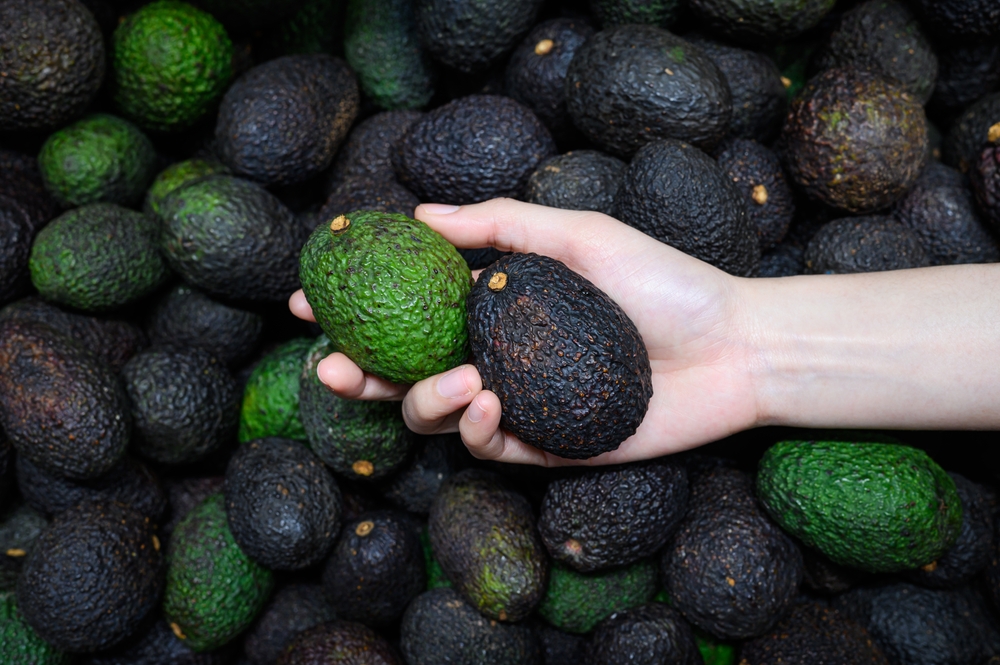
1. Super soft fruits
The best way to test most kinds of fruits to see if they are ripped is to give them a gentle squeeze. Whether it’s melons, avocados, mangos, citrus, plums, apricots, or peaches, you should ensure you choose those that are fresh. This also applies to delicate items like berries, which should be plump and firm, not mushy or weeping juice.
Fruit at its peak will give slightly when pressed and bounce back rather than stay dented and bruised. But if you see an enticing tower of dark green avocados at the grocery store and they are on sale and all seem easily squeezable, you may want to steer clear. This is the perfect example of groceries you should never buy on sale. The sale sticker is often a sign that the store needs to move the product quickly before it becomes unsellable. These fruits are already at or past their prime.
According to the FDA, avocados can last up to four days if kept in the fridge after the day of purchase, but if yours are already past their prime, you’ve got far less time—often less than a day. By the time you get them home, they might be too far gone for even guacamole. The same logic applies to a container of berries on sale; a quick inspection will likely reveal mold spores or crushed fruit at the bottom.
Overripe avocados are highly prone to bruising, and you definitely don’t want to slice open yours at home only to discover a brown, stringy, and unappetizing mess inside. The flavor can also be off-putting and slightly bitter. In fact, by the time you get home with your cheap avocados, they will likely be long past their peak texture and flavor, making your “bargain” a complete waste.
What you should do instead is opt for lighter green, firmer avocados. After a couple of days on the counter, the fruit will ripen naturally and have the perfect creamy consistency to spread on your toast. Apply the same rule of thumb to other delicate fruits and vegetables, too. It’s better to pay full price for produce that will last and ripen perfectly at home than to get a discount on something you have to throw away.
2. Bruised produce
Some of the groceries you should never buy on sale are bruised produce. Over recent years, “imperfect” produce (also known as ugly produce) has become popular, debunking the idea that fruits and veggies have to look a certain way so you know they are fresh and tasty. This is a positive movement that reduces food waste, and a misshapen pepper or a crooked carrot is perfectly fine to eat.
But in most cases, when produce has visible signs of age and damage and is on sale, the deal is too good to be true. These signs include brown spots, dark bruises, scabs, or cuts. Bruising indicates that the cell walls of the produce have been ruptured, which starts the process of decay and makes the area a breeding ground for bacteria. The same thing is true if the fruits or vegetables look shriveled and dried out, like wilted lettuce or wrinkly bell peppers.
These are all signs that the produce has been sitting around for quite a while at the supermarket, and it won’t have the texture, flavor, or nutrients you’re looking for, making them one of the groceries you should never buy on sale. That bag of discounted, slightly slimy spinach or those spotty bananas are on sale for a reason: they have a very short remaining shelf life and have already lost a significant amount of their nutritional value.
There’s a difference between an apple with unique coloring and one with bruises. If you notice deep indents on produce, it’s a sign that that fruit or vegetable has oxidized and is no longer at peak freshness. These soft spots will turn to rot very quickly. These are groceries you should never buy on sale, so opt for produce that is firm, vibrant, and bruise-free instead. Paying a little extra for quality ensures your food will last longer and be more enjoyable to eat.
3. Soon-to-expire dairy products
Dairies are another category of groceries you should never buy on sale. When it comes to soon-to-expire dairy products, it may be tempting to pick them up, as they’re usually on sale with a bright “manager’s special” sticker. However, while not every expiration date is a hard-and-fast deadline for freshness and food safety, certain items are best bought in advance of their use- or sell-by date, especially dairy.
Fresh dairy products, especially those in large containers, such as yogurt, milk, cottage cheese, and cream, will start to go bad soon after they’re opened and exposed to air. Spoilage can happen rapidly. FDA recommendations state that milk can be stored in the fridge for up to seven days, while yogurt takes one to two weeks. However, these timeframes assume you’re starting with a fresh product, not one that’s already on the verge of expiring.
This being said, unless you’re sure you can finish a gallon of half-off milk within a couple of days or so, keep in mind that these are groceries you should never buy on sale. The same goes for that giant tub of discounted sour cream or ricotta cheese. If you don’t have an immediate, specific plan to use the entire container, you risk it developing a sour smell or visible mold before you can finish it.
In other words, it’s better to pay full price or choose a smaller container that won’t be sitting in your refrigerator for days, taunting you with its impending doom. The potential for waste often negates the initial savings. A full-priced, smaller carton of milk you use completely is far more economical than a half-priced gallon you pour down the drain.
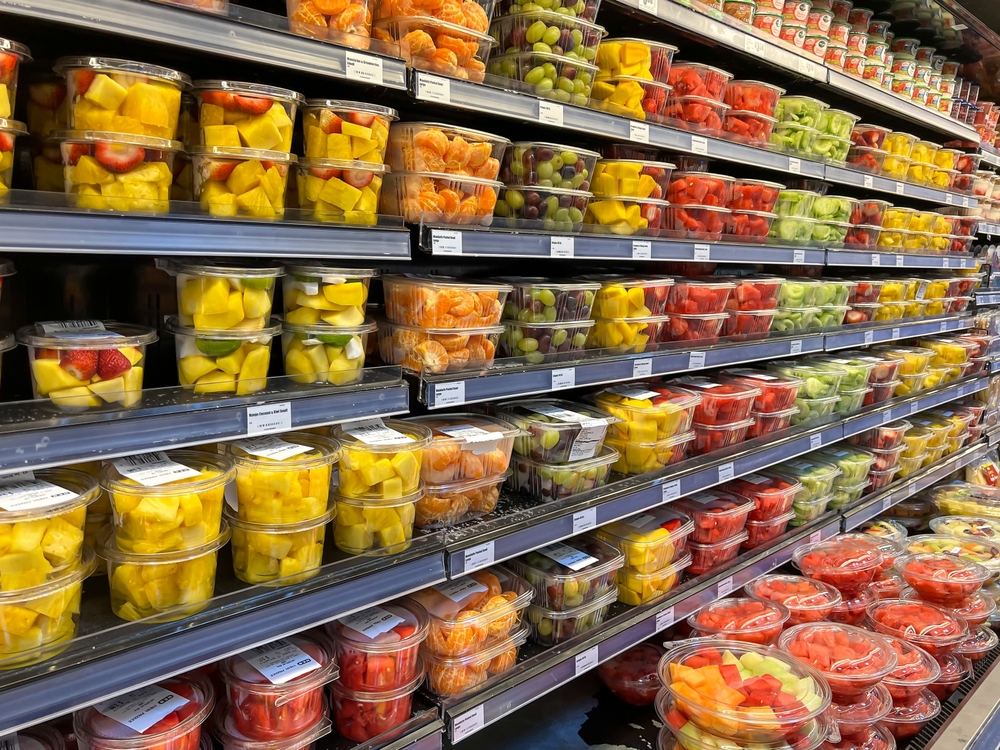
4. Pre-cut produce
Buying pre-chopped or pre-cut produce can be very convenient, but it’s not always the best choice to make at the grocery store. As one category of groceries you should never buy on sale, you’re getting way less bang for the money you spend on it, and there’s a chance that there’s cross-contamination since someone else prepared it. The increased handling and surface area exposure significantly raise the risk of contamination with bacteria like Salmonella or E. coli.
Yes, it’s tempting to buy pre-cut produce on sale. Not only will you save some money, but you’ll also have a healthy snack ready to go. However, when these items are marked down, it’s typically because they are approaching their expiration date. It’s likely that the quality isn’t up to snuff, so you could be putting yourself and your family at risk of contracting a foodborne illness. The convenience is not worth the potential danger.
Furthermore, from the moment produce is cut, it begins to lose vital nutrients. Exposure to oxygen, light, and heat degrades vitamins like vitamin C and antioxidants. A container of pre-cut strawberries on sale will be far less nutritious than a whole strawberry you slice yourself right before eating. The flavor and texture also suffer; pre-cut items can become slimy, dried out, or simply less flavorful than their whole counterparts.
Read on to discover other groceries you should never buy on sale!
5. Pre-packaged meals
If you need something to eat in a pinch, a pre-made meal from the supermarket may sound like a great option. Items like refrigerated lasagna, pre-made sandwiches, or deli salads offer ultimate convenience. However, the main drawback of these convenient dishes (on sale or not) is that they’re usually packed with fat, sodium, and preservatives and will never be as nutritive as what you prepare at home. The ingredient lists are often long and filled with additives to extend shelf life.
In other words, these ready-made meals definitely serve a purpose when you need them most, like during a busy work week or when you’re feeling under the weather. They can be a lifesaver in those moments. Meal-prepping your own food is ideal, but not always realistic for everyone’s schedule.
However, when it comes to those that are on sale, it’s better to skip them altogether. Similar to other groceries you should never buy on sale, if it’s got a sale sticker on it, there’s a high chance it’s been sitting in the refrigerated case since the day before, or even longer. The product likely won’t be at peak freshness. The lettuce in that discounted sandwich will be wilted, and the chicken in that ready-to-heat meal is likely nearing its final day of safety.
Instead of opting for a discounted pre-made meal, consider keeping your pantry stocked with staples for quick, healthy meals you can throw together yourself. A simple pasta with canned tomatoes, garlic, and frozen vegetables is often just as fast, significantly cheaper, and much healthier than a store-bought meal laden with sodium.
6. Damaged canned goods
While it’s true that canned goods can be stored in your pantry for longer than most food items, not all canned goods are okay for the long haul. Bumps and dents can happen, especially if the cans are handled poorly during transit, and the USDA recommends avoiding those with deep dents, particularly ones “that you can stick your finger into” or any dents on the top or bottom seams. Similar to other groceries you should never buy on sale, damaged canned goods can put your health at risk.
Why is that? The craters and sharp dents, especially along the seams, can create microscopic cracks in the can’s lining, letting in air and potentially dangerous bacteria, such as Clostridium botulinum, which causes botulism. Botulism is a rare but severe illness that can be fatal. The store will want to get rid of those damaged goods, so they will put them in a discount bin or on sale. Well, now that you’ve read this, you should know the deal isn’t worth the risk. The same thing applies for any jars or cans that are bulging on the lids or sides, or that are leaking or rusty, as these are all signs of compromised seals and potential spoilage.
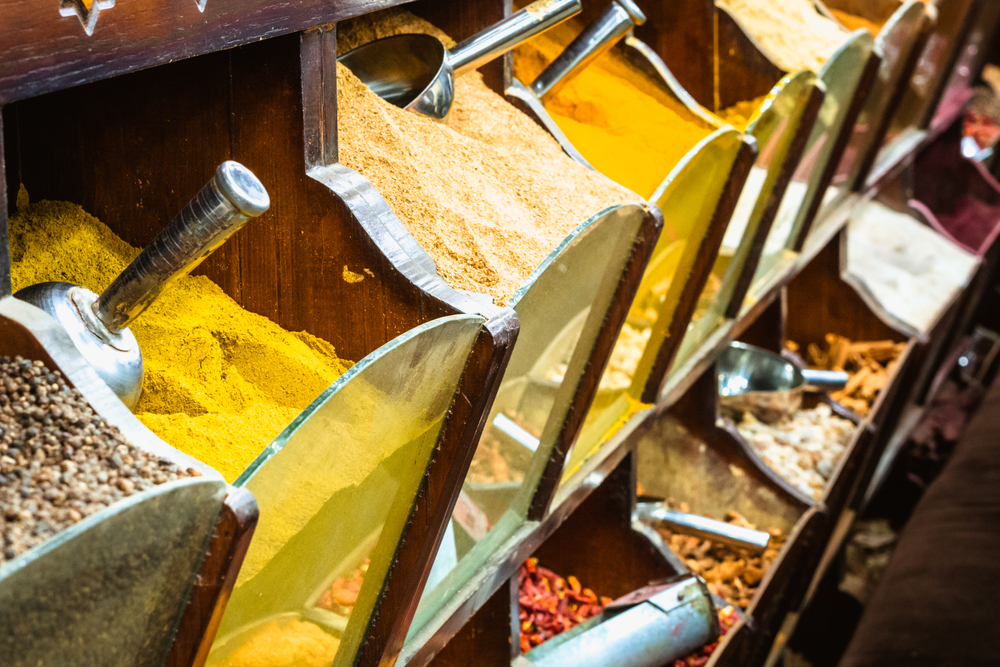
7. Bulk spices
Next on the list of groceries you should never buy on sale are bulk spices. Despite what many might think, dried herbs and spices don’t last forever. In fact, you’ll probably be surprised to learn that most ground spices lose their potency and begin to taste like dust within six months to a year from the time you open the package. Whole spices, like peppercorns or cloves, last longer, but even they degrade over time.
While dried spices won’t necessarily rot or spoil like fresh products, they do lose their aroma, flavor, and potency over time, especially after they’ve been exposed to light, heat, and air. The essential oils that give them their characteristic taste and smell simply evaporate. So, while buying a giant, discounted container of a spice in bulk may seem more cost-effective at the moment, you’ll likely wind up wasting money because you won’t be able to use all that paprika or cinnamon before it becomes flavorless.
This is particularly true for spices you use infrequently. A large sale-priced bag of star anise might seem like a great find, but if you only use it once a year for a special dish, the rest will sit in your pantry losing its flavor. It’s a much better strategy to buy smaller jars of spices as you need them, ensuring they are always fresh and potent for your cooking. You’ll end up with more flavorful food and less waste.
By the way, here’s a great spice rack to keep your herbs and condiments neat and easily accessible.
8. Products you can’t properly store
Another category of groceries you should never buy on sale are items that you simply don’t have the proper storage space for. For instance, if your freezer is already packed with fruits for smoothies, use those up before buying a super-cheap, family-sized box of ice cream novelties, no matter how good the deal is. A great sale is no bargain if the item gets freezer burn before you can eat it.
Moreover, it’s never a good idea to overcrowd the storage space in your kitchen, because that makes it almost impossible to keep track of what you have. A stuffed refrigerator or freezer can impede proper air circulation, creating warm spots and causing food to spoil faster. A pantry so full that items are hidden in the back is a recipe for forgotten food, which leads to waste and defeats the purpose of saving money.
Think practically about your consumption habits. A two-for-one deal on giant bags of potato chips only saves you money if your family will eat them before the second bag goes stale. That 10-pound bag of potatoes on sale is a terrible deal if you live alone and they sprout and soften before you’ve used more than a few. Be realistic about how much you can consume before an item perishes. Always check your pantry, fridge, and freezer before you go to the store to avoid buying things you don’t need or have room for.
Being a smart shopper means thinking beyond the price tag. The true value of a grocery item lies in its quality, freshness, and the likelihood that you’ll actually use it. By avoiding these sale-item traps, you’ll reduce food waste, protect your health, and ultimately keep more money in your pocket.
If you liked our article on groceries you should never buy on sale, you may also want to read Comparison Shopping: 8 Best Tips on How to Get Great Deals.





